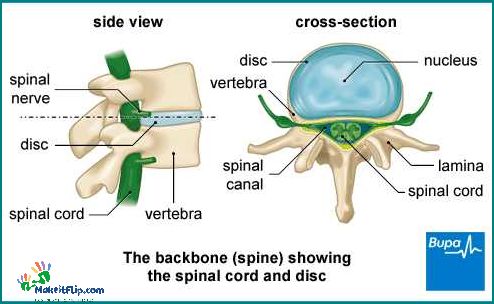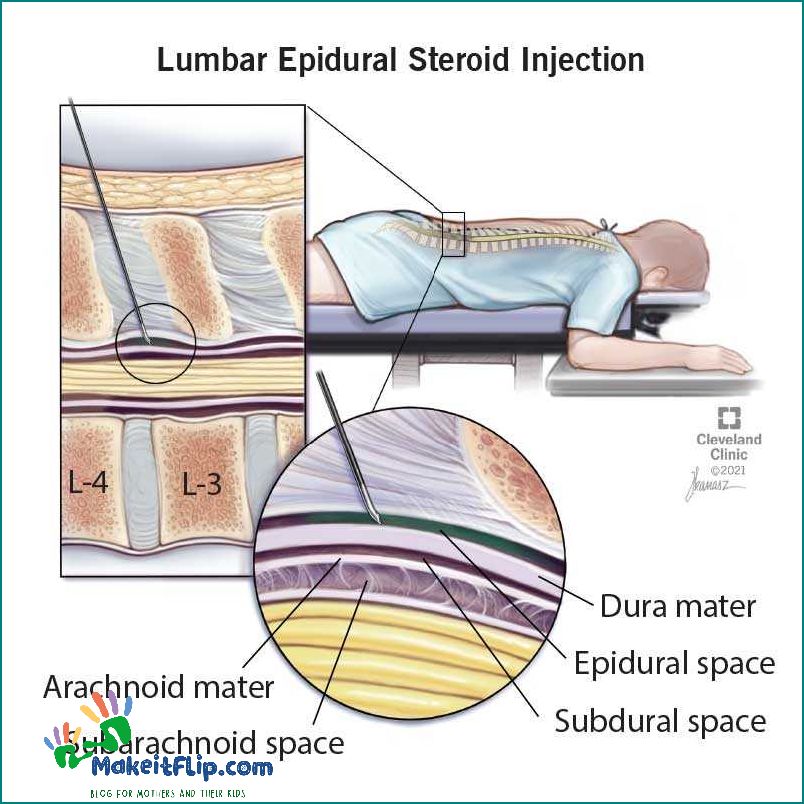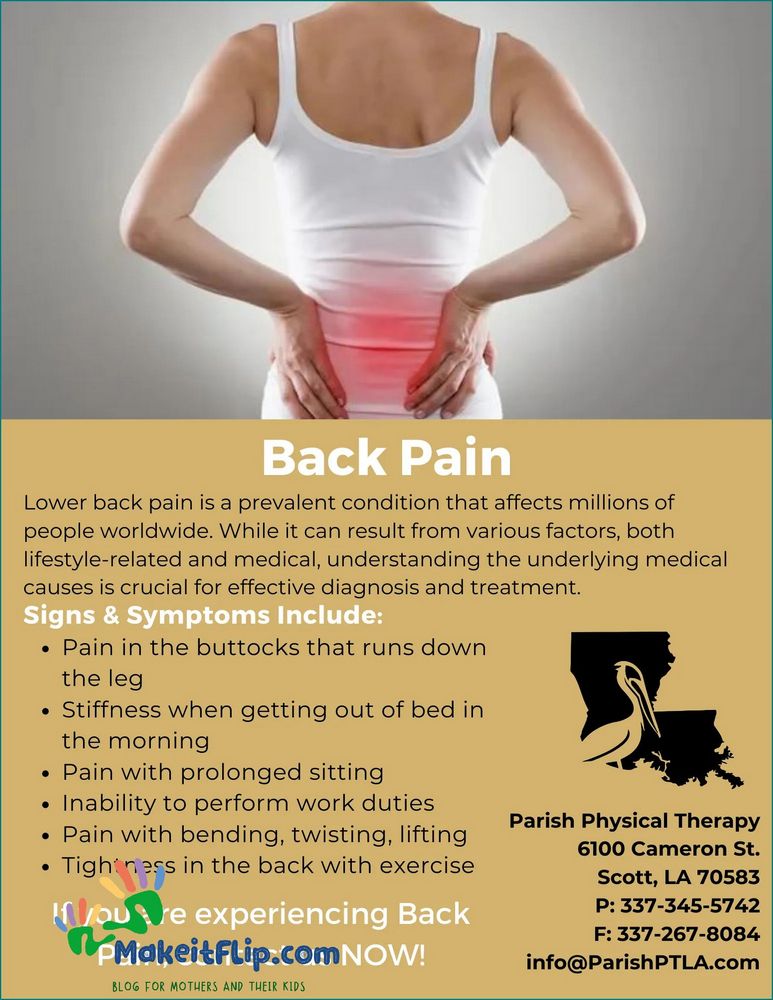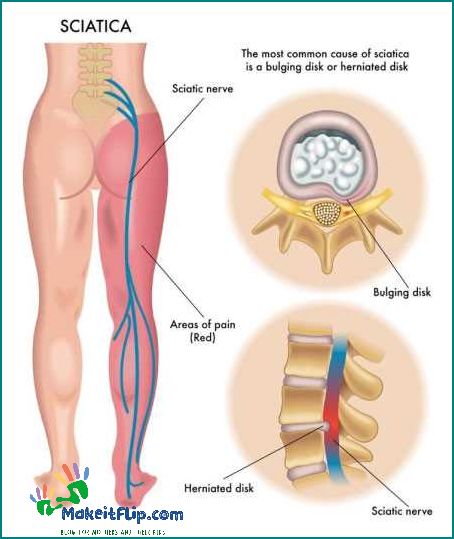Contents
Understanding and Managing Epidural-Induced Back Pain: Causes, Symptoms, and Effective Treatment Options

Back pain is a common discomfort that affects millions of people worldwide. It can be caused by various factors, including injuries, muscle strain, and spinal conditions. One potential cause of back pain is an epidural, a procedure commonly used to relieve pain during childbirth or surgery. While epidurals are generally safe and effective, some individuals may experience back pain after the procedure.
The spine is a complex structure that consists of bones, discs, and nerves. During an epidural, a needle is inserted into the back to deliver medication near the nerves in the spinal cord. While this can provide pain relief, it can also cause temporary or long-term side effects, including back pain. The exact cause of back pain after an epidural can vary, but it is often related to irritation or inflammation of the nerves in the back.
Common symptoms of back pain after an epidural include localized pain, numbness, and tingling sensations. The pain may be sharp or dull and can radiate to other areas of the body, such as the legs. In some cases, individuals may also experience muscle weakness or difficulty moving. If you are experiencing any of these symptoms after an epidural, it is important to consult with a healthcare professional for an accurate diagnosis and appropriate treatment.
Treatment options for back pain after an epidural depend on the severity and underlying cause of the pain. In many cases, conservative approaches such as physical therapy, pain medications, and hot or cold therapy can help alleviate symptoms. In more severe cases, epidural steroid injections or surgical interventions may be necessary to address the underlying issue. It is crucial to work closely with a healthcare provider to develop a personalized treatment plan that addresses your specific needs and goals.
Understanding and managing back pain after an epidural is essential for individuals who have undergone this procedure. By recognizing the causes, symptoms, and treatment options, individuals can take proactive steps to alleviate their pain and improve their quality of life.
Causes of Back Pain after Epidural

Back pain after an epidural can be caused by a variety of factors. One common cause is the injection itself. During an epidural, a needle is inserted into the spine to deliver medication to the nerves in the area. This can sometimes cause temporary discomfort or pain.
Another possible cause of back pain after an epidural is nerve irritation. The needle used for the injection can sometimes irritate the nerves in the spine, leading to pain or numbness in the back.
In some cases, back pain after an epidural may be a result of the epidural medication itself. Some individuals may have a reaction to the medication, which can cause discomfort or pain in the back.
Additionally, the positioning during the epidural procedure can contribute to back pain. If the patient is not positioned correctly or if there is excessive pressure on the spine during the injection, it can result in pain or discomfort afterwards.
It is important to note that while back pain after an epidural is common, it is usually temporary and will subside on its own. However, if the pain persists or is severe, it is important to consult a healthcare professional for further evaluation and treatment.
Spinal Misalignment

Spinal misalignment is a common issue that can occur after an epidural injection. The back pain experienced after an epidural injection can be caused by the needle hitting a nerve or by the injection itself. This can lead to inflammation and irritation of the nerves in the spine, resulting in pain and discomfort.
In some cases, spinal misalignment can also cause numbness or tingling sensations in the back or legs. This occurs when the misalignment puts pressure on the nerves, causing them to become compressed or pinched. This can result in radiating pain or numbness that can be felt in different areas of the body.
Treatment options for spinal misalignment after an epidural injection may include chiropractic adjustments, physical therapy, or exercises to improve posture and strengthen the muscles supporting the spine. These treatments can help to realign the spine, relieve pressure on the nerves, and reduce pain and discomfort.
It is important to consult with a healthcare professional if you are experiencing back pain or other symptoms after an epidural injection. They can provide a proper diagnosis and recommend the most appropriate treatment options for your specific condition.
Nerve Irritation

After an epidural injection, it is not uncommon to experience pain or discomfort in the back. This is often due to nerve irritation caused by the injection itself. The spine is a delicate structure, and the nerves that run through it can be easily irritated or damaged.
When an epidural injection is administered, a needle is inserted into the epidural space, which is located just outside the spinal cord. The purpose of the injection is to deliver medication directly to the nerves in the spine, providing relief from pain or inflammation. However, the needle can sometimes cause irritation to the surrounding nerves, leading to symptoms such as pain, tingling, or numbness.
In some cases, the nerve irritation may be temporary and resolve on its own. However, in other cases, it may persist and require further treatment. If you are experiencing persistent pain or discomfort after an epidural injection, it is important to consult with your healthcare provider.
Treatment options for nerve irritation after an epidural injection may include physical therapy, medication, or other interventions. Physical therapy can help to strengthen the muscles supporting the spine and improve overall spinal health. Medications, such as anti-inflammatory drugs or pain relievers, may be prescribed to help manage symptoms. In some cases, additional interventions, such as nerve blocks or surgery, may be necessary to alleviate the nerve irritation.
It is important to communicate any symptoms or concerns with your healthcare provider so that they can determine the best course of treatment for your specific situation. With proper management and care, nerve irritation after an epidural injection can often be effectively treated, allowing you to find relief from pain and discomfort.
Inflammation

Inflammation is a common side effect that can occur after an epidural injection for back pain. The injection itself can cause irritation and inflammation in the surrounding tissues, leading to pain and discomfort.
When the epidural injection is administered, a needle is inserted into the epidural space, which is located in the spine. This space is filled with nerves and blood vessels, and when the needle is inserted, it can cause damage to these structures, leading to inflammation.
Symptoms of inflammation after an epidural injection may include pain, swelling, redness, and warmth at the injection site. Some patients may also experience numbness or tingling in the back or legs, which can be a sign of nerve irritation.
Treatment options for inflammation after an epidural injection may include rest, ice or heat therapy, over-the-counter pain medications, and physical therapy. In some cases, a doctor may prescribe stronger pain medications or recommend a corticosteroid injection to reduce inflammation.
It is important to monitor any symptoms of inflammation after an epidural injection and report them to a healthcare provider. In some cases, further medical intervention may be necessary to manage the inflammation and alleviate pain.
Symptoms of Back Pain after Epidural

Back pain after an epidural can manifest in various ways, causing pain and discomfort in the spine and surrounding areas. It is important to be aware of these symptoms in order to properly manage and treat the condition.
One of the most common symptoms is persistent pain in the back, which may be localized or radiate to other parts of the body. The pain can range from mild to severe and may worsen with certain movements or activities.
In addition to pain, individuals may also experience discomfort or aching sensations in the back. This discomfort can be constant or intermittent and may be accompanied by a feeling of pressure or tightness.
Another symptom is numbness or tingling in the back or down the legs. This can be a sign of nerve irritation or compression, which may occur as a result of the epidural procedure.
It is important to note that these symptoms may not appear immediately after the epidural, but can develop over time. If you experience any of these symptoms after an epidural, it is important to consult with a healthcare professional for a proper diagnosis and treatment plan.
Persistent Pain

After an epidural injection, it is not uncommon to experience persistent pain in the back or spine. This pain can range from mild discomfort to severe and debilitating. It is important to understand the potential causes of persistent pain after an epidural injection in order to effectively manage and treat it.
One possible cause of persistent pain is nerve damage. During the epidural injection, the needle may accidentally damage a nerve, leading to ongoing pain. This can result in symptoms such as numbness, tingling, or shooting pain in the back or spine.
Another potential cause of persistent pain is inflammation. The epidural injection can cause inflammation in the surrounding tissues, which can lead to ongoing discomfort. In some cases, this inflammation can put pressure on the nerves in the back, resulting in pain.
In some instances, persistent pain after an epidural injection may be unrelated to the procedure itself. It is possible that the injection simply did not effectively address the underlying cause of the pain, such as a herniated disc or spinal stenosis. In these cases, further treatment options may be necessary to alleviate the pain.
Treatment options for persistent pain after an epidural injection may include physical therapy, medication, or additional injections. Physical therapy can help strengthen the muscles in the back and spine, providing support and reducing pain. Medications, such as anti-inflammatory drugs or pain relievers, may be prescribed to manage the discomfort. In some cases, additional epidural injections may be recommended to target the specific area causing the pain.
It is important to consult with a healthcare professional if you are experiencing persistent pain after an epidural injection. They can evaluate your symptoms and determine the best course of treatment for your individual situation.
FAQ about topic Understanding and Managing Back Pain after Epidural Causes Symptoms and Treatment Options
What is an epidural?
An epidural is a procedure in which medication is injected into the space around the spinal cord to provide pain relief.
What are the common causes of back pain after an epidural?
Common causes of back pain after an epidural include inflammation, muscle strain, nerve irritation, or infection.
What are the symptoms of back pain after an epidural?
Symptoms of back pain after an epidural may include localized pain, radiating pain, numbness, tingling, or weakness in the back or legs.
How is back pain after an epidural treated?
Treatment options for back pain after an epidural may include physical therapy, medication, hot or cold therapy, or in severe cases, surgery.
Can back pain after an epidural be prevented?
While it may not be possible to completely prevent back pain after an epidural, certain measures such as maintaining good posture, avoiding heavy lifting, and practicing proper body mechanics during daily activities may help reduce the risk.
What is an epidural?
An epidural is a procedure in which medication is injected into the space around the spinal cord to provide pain relief.
I’m Diana Ricciardi, the author behind Makeitflip.com. My blog is a dedicated space for mothers and their kids, where I share valuable insights, tips, and information to make parenting a bit easier and more enjoyable.
From finding the best booster seat high chair for your child, understanding the connection between sciatica and hip pain, to exploring the benefits of pooping in relieving acid reflux, I cover a range of topics that are essential for every parent.
My goal is to provide you with practical advice and solutions that you can easily incorporate into your daily life, ensuring that you and your child have the best possible experience during these precious years.
